COMMITTEE FOR REGIONAL DEVELOPMENT
End of Session Report September 2008 - August 2009
REMIT AND POWERS
The Committee for Regional Development was established in accordance with paragraphs 8 and 9 of the Belfast Agreement, Section 29 of the Northern Ireland Act 1998 and under Standing Order 48 to advise and assist the Minister for Regional Development, Conor Murphy MP MLA, on matters within his responsibility as a Minister. The Committee undertakes a scrutiny, policy development and consultation role in respect of the Department for Regional Development and plays a key role in the consideration and development of legislation.
The Committee has the power to
- Consider and advise on departmental budgets and annual plans in the context of the overall budget allocation;
- Consider and approve relevant secondary legislation and take the Committee Stage of relevant primary legislation;
- Call for persons and papers;
- Initiate inquiries and make reports; and
- Consider and advise on matters brought to the Committee by the Minister.
MEMBERSHIP
Democratic Unionist Party |
|
Green |
|
Sinn Fein |
|
Social Democratic and Labour Party |
|
Ulster Unionist Party |
|
|
1 With effect from 15 September 2008 Mr Allan Bresland replaced Mr William Irwin and Mr Alastair Ross replaced Mr Stephen Moutray.
2 With effect from 22 June 2009 Mr Danny Kinahan replaced Mr John McCallister.
3 With effect from 29 June 2009 Mr Tommy Gallagher replaced Mr John Dallat.
4 With effect from 4 July 2009 Miss Michelle McIlveen replaced Mr Jim Wells.
END OF SESSION REPORT FOR 2008-09
This report covers the work of the Committee for Regional Development during the parliamentary year from September 2008 to August 2009.
The Committee had a busy work programme in 2008-09. Water and sewerage services together with public transport continued to be high priority areas for the Committee. The Committee undertook an inquiry into the management of data risks in Northern Ireland Water, scrutinised Translink’s fare increases and fuel purchasing policy, and proposals for the reform of public transport in Northern Ireland. It considered proposals for a draft Roads Miscellaneous Provisions Bill, and engaged with a wide range of stakeholders on both sustainable transport and accessible transport. The Committee reported to the Assembly’s Finance and Personnel Committee on the Executive’s Strategic Stocktake, and considered a substantial number of items of subordinate legislation.
The Committee held 34 meetings, one of which took place outside of Parliament Buildings. The majority of the Committee’s meetings, 33, were open in full or part to the public. The Committee visited Dublin to study bus lanes, and made 2 visits in Northern Ireland, to the Belfast Sewers Project, and George Best Belfast City Airport.
Subordinate legislation:
The Committee considered over 180 items of subordinate legislation this year and took oral evidence from Departmental officials and others where appropriate. Although the Committee was content with most of the proposals, arising from this scrutiny, the Committee decided to examine the Department’s policy on the abandonment of land to facilitate developers, with a view to ascertaining how the public purse might share in the benefits accruing from such abandonments. The work is scheduled to begin in the 2009 – 2010 session.
Inquiries:
Following widely publicised problems with billing and forecasting in Northern Ireland Water, the Committee decided to conduct an inquiry into the management of data risks in Northern Ireland Water. Running from November 2008 to July 2009, the focus of the inquiry was on critically evaluating the current approach to identifying, managing and mitigating risks in Northern Ireland Water’s base data and, where appropriate, to make recommendations for improvements to protect customers and the public purse. The Committee heard evidence from Northern Ireland Water Limited, the Shareholder Unit and Water Policy Division of the Department for Regional Development, the Northern Ireland Authority for Utility Regulation, the Consumer Council, an independent expert on the data used in regulated water and waste water utilities, Steria (then the lead contractor in Crystal Alliance) and KPMG as Northern Ireland Water Limited’s auditors. To support its work in this highly technical area, the Committee appointed a specialist adviser, who provided advice to the Committee on best practice in data management in the water and sewerage services industry, and a critical evaluation of Northern Ireland Water’s practice against examples of good practice within the industry. Evidence sessions were concluded in July 2009. The publication of the report for debate by the whole Assembly is anticipated before the end of 2009.
Sustainability in the area of public transport has been an area of interest for the Committee and, in July 2009, the Committee issued a call for evidence as part of an inquiry into sustainable transport in Northern Ireland. The deadline for receipt of written submissions is September 2009, and the focus of the inquiry will be to explore and clarify the social, environmental and economic aspects of sustainable transport; to identify the policies, attitudes and technologies likely to underpin a move to more sustainable transport in Northern Ireland; and to make recommendations to the Assembly in this area.
Budget scrutiny:
In addition to its consideration of the outcome of the Executive’s Strategic Stocktake, the Committee provided feedback to the Minister on the Department’s quarterly monitoring round returns. At the end of the session, Members remained concerned that funding levels for structural maintenance are seriously inadequate, and that the future funding of water and sewerage services in Northern Ireland must be addressed by the Executive. The Committee, concurrently with the Finance and Personnel Committee, also heard evidence on options for the Northern Ireland Executive to mitigate the recession. The Committee maintains a keen interest in these areas and will continue to question the Department on these issues.
Policy Scrutiny:
During this session the Committee considered a number of important policy areas.
PC10 is the first regulated price control settlement for water and sewerage services in Northern Ireland. The first stages of PC10 came to the Committee in 2009 and, having taken oral evidence from the key stakeholders, the Committee provided comment to the Minister on his draft environmental and social guidance to the Utility Regulator. The Committee was broadly content with the issues identified for priority investment. Specifically, the Committee wanted to see the investment needed to address the problems in data quality and systems improvement, and the benefits of this investment realised, within the PC10 period. Members also stressed that work to address the issue of sewerage flooding within properties should be addressed as a matter of priority, within the PC10 timescale or sooner. The Committee also sought to prioritise the introduction of carbon cost in planning infrastructure within the PC10 period. It also pressed for greater integration of water and sewerage infrastructure planning with both land use planning and the Regional Development Strategy. Work on the development of guidance and price control will continue into the 2009 – 2010 session, when the Committee will provide its views on the Utility Regulator’s interim determination and the Minister’s final environmental and social guidance.
The Committee also scrutinised Translink’s corporate and business plan, fare increases and fuel purchasing policy during this session. The Committee was critical of the lack of priority afforded actions to address disability and accessibility issues in Translink’s corporate and business plan, and of the approach taken by Translink to its fuel purchasing policy, specifically its approach to fuel cost hedging. Translink implemented a second fare increase in 2009, and the Committee highlighted the shortcomings in consulting on and agreeing Translink’s fare increases. A new process and timetable is now in place which makes provision for consultation with the Committee prior to fare increases.
The strategic business case for the reform of public transport was considered by the Committee in September and October 2008. The Committee heard evidence provided by the Federation of Passenger Transport, Translink, the Department for Regional Development, the trade unions, and the Consumer Council. Having considered the oral evidence and the issues in the strategic business case, Members were please to note that under the proposals, public transport would remain regulated, and that competition would be controlled and service providers would continue to require both an operator licence and a route licence before they could begin to operate a service. The Committee recommended that the options for reform proposed by Translink should be explored and developed more fully, and included as an option in the outline business case. Finally, Members recommended that any decision on the preferred structure for a middle tier organisation be deferred until the outcome of the outline business case is known and until full costs and benefits have been identified for the full range of options.
In addition, the Committee scrutinised the Minister’s proposals for guidance on master planning for ports in Northern Ireland, and Northern Ireland’s draft River Basin Management Plans. The Committee was broadly content with the Minister’s proposals for guidance on master planning for ports, and awaits the outcome of the public consultation on this area. The Committee’s response to the public consultation on the draft River Basin Management Plans is available on its web pages.
The Committee also responded to calls for evidence from the Committee for Finance and Personnel’s Public Procurement Inquiry, the Environment Committee’s Climate Change Inquiry, the Committee for the Office of the First Minister and deputy First Minister’s report on the Barosso Taskforce Report and the proposals to remove the exemption for operators of transport services from Part III of the Disability Discrimination Act 1995. Copies of these responses are available on the Committee’s web pages.
Pre-legislative scrutiny:
The Committee considered the outcome of the public consultation on proposals for a Roads Miscellaneous Provisions Bill. The Committee was broadly content with the proposals, and recommended that the Department apply the lessons in the Public Accounts Committee report on Roads Openings by Utilities (Report 33/08/09R) in implementing, managing and monitoring a permit scheme such as is proposed by the Department. A Bill is anticipated in the next session. At that time, the Committee will explore further how the Department intends to implement the chargeable permit schemes for road openings, and to manage the permit scheme for road closures for certain events.
Engagement:
The Committee for Regional Development held a number of successful stakeholder engagement events during this session. Members visited Dublin to study the impact of bus lanes on travel and transport in the Dublin area, met with the Joint Oireachtas Transport Committee, and with elected representatives and officials on strategic planning issues.
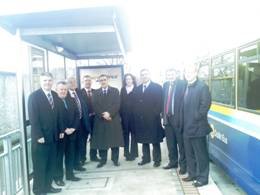 |
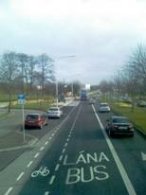 |
On 6 February 2009, a research-led stakeholders exercise was held in the Long Gallery, Stormont with representatives from the business, social and environmental sectors as well as transport operators. A report on this event will be published in October 2009 as part of the Committee’s work on its inquiry into sustainable transport.
In conjunction with the Environment Committee, the Committee held a joint stakeholder engagement event in the Long Gallery on 1 April 2009 on the subject of the draft River Basin Management Plans. A report on the event was agreed by the respective committees in June 2009, and was submitted to the Department for the Environment as part of the public consultation event on the draft River Basin Management Plans.
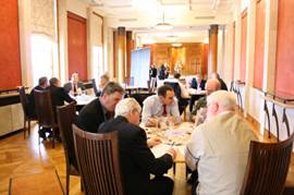 |
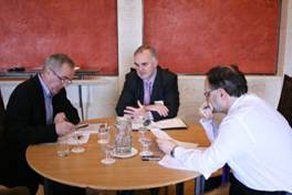 |
Also in June 2009, the Committee held a research event with representatives from the older people’s and disability sectors in Northern Ireland. Feedback from the session was positive, a report on the event will be considered by the Committee early in the next session, and will inform the Committee’s response to the consultation on the Accessible Transport Strategy Action Plan.
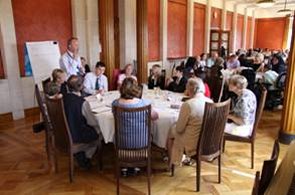 |
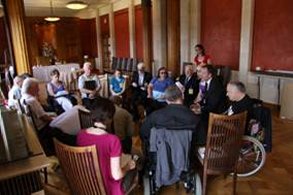 |
The Committee held a meeting at George Best Belfast City Airport and toured the airport facilities. The Committee also visited the Belfast Sewers project to view progress on the new sewers and pumping station.
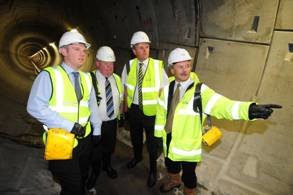 |
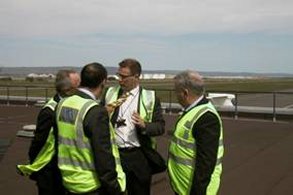 |
Committee priorities for the next session:
Looking forward to the next session, the Committee will begin the work of careful clause by clause scrutiny of the Water and Sewerage Services (Amendment) Bill, and anticipates the introduction of the proposed Roads (Miscellaneous Provisions) Bill, as well as legislation to enable work on rapid transit for Belfast to begin.
In terms of the Committee’s other priorities, it has identified two specific areas of work: sustainable transport and accessible transport. The oral evidence sessions for the Committee’s inquiry into sustainable transport will begin in the new session with a report anticipated before summer recess. Following on from the stakeholder event on transport and accessibility, the Committee will consider the event report and decide on a way forward on this issue, early in the new session.
Further information on the work of the Regional Development Committee can be found at archive.niassembly.gov.uk/regional/2007mandate/regionhome_07.htm
ANNEX A
Committee for Regional Development - Expenditure for the period 1 September 2008 – 31 August 2009
| Budget area | Details | Expenditure |
|---|---|---|
| Committee Travel - committee members and staff travel and subsistence in relation to visits and meetings outside Parliament Buildings | Includes the cost of committee visits to:
|
£2,842 |
| Advertising – the cost of public notices relating to committee inquiries, the committee stage of bills and meetings held outside Parliament Buildings | Includes the cost of public notices in relation to:
|
£2,634 |
| Consultancy support - the cost of specialist advisers appointed by the committee and commissioned research | Specialist adviser to the Committee on its inquiry into the management of data risks in Northern Ireland Water Limited. | £21,190 |
| General expenses | Cost of refreshments for committee meetings, working lunches, seminars, room hire and witness expenses | £3,397 |
| £30,063 |
